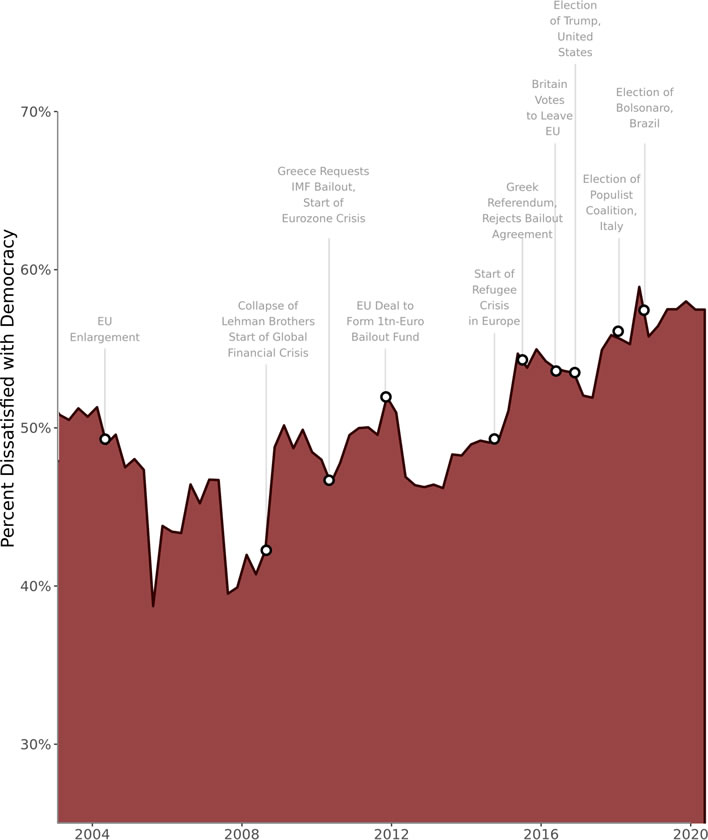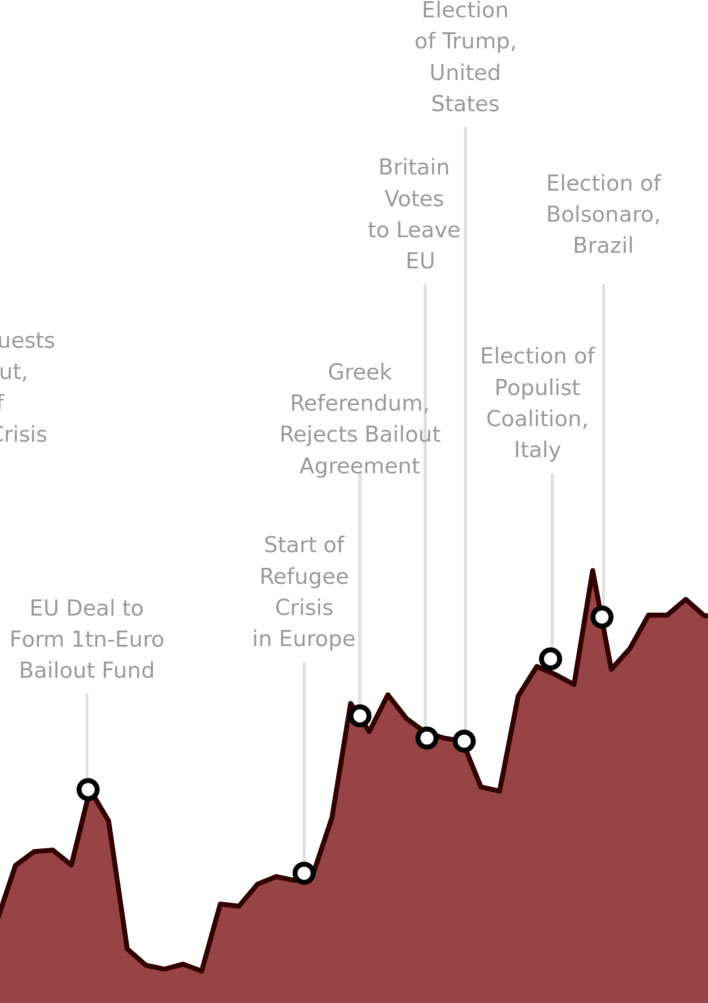Democratic discontent
Richard Law, UTC 2020-01-30 14:22
A stunner from the Centre for the Future of Democracy:
2019 had the "highest level of democratic discontent" since detailed global recording began in 1995.
We get no further than the first bullet point, before our brains have to reboot.
What on earth is 'democratic discontent'? Does this mean discontent which is shared equitably among the populace? Or is this discontent with democracy itself? Or is this discontent with democratically elected institutions which don't do what you personally want them to do? Would the discontented rather have the firm whack of an authoritarian jackboot on their behinds? How can we understand this discontent, let alone quantify it?
Question upon question. Better read on. Something may turn up. Let's try the second bullet point:
Many large democracies [are] now at their highest-ever recorded level for democratic dissatisfaction, including the UK, US, Brazil, Mexico and Australia.
What on earth is 'democratic dissatisfaction'? Is it the same as 'democratic discontent'. Apart from holding the odd election (under wildly differing political systems) what do these 'many' large democracies have in common? Are the brains of the Centre for the Future of Democracy really comparing 'democratic dissatisfaction' in such a heterogeneous group of nations as the UK, USA, Brazil, Mexico and Australia?
It seems like it. If you can stomach it, there is plenty more social science babble on this topic at the link to the press release. After a break for another brain reboot, let's pick up here and see if we can work out what they are talking about:
The downward trend in satisfaction with democracy has been especially sharp since 2005, which marks the beginning of what some have called a 'global democratic recession'.
The 'global democratic recession'? I haven't noticed any shortage of elections since 2005, have you? In fact, the British in particular have had a surfeit of them in recent years. What are they talking about?

That 'global democratic recession' made manifest. We climate deniers know exactly what to do with graphs like this. Our first step is to look at the y-axis. Motto 1: trust no graph that doesn't have a zero on the y-axis. Motto 2: trust no percentage graph that doesn't have one hundred percent on the y-axis. If we were to draw this y-axis correctly, the graph would scale into a little wiggle across the centre between fifty and fifty-five percent. Image: Democracy Report 2020. NB: To improve legibility we have reduced the start of the x-axis from 1996 to 2004 (it was essentially a flat line between those two dates).
Perhaps it's that thing called the internet – that cause of all our woes, the beginning of that process when a growing number of people shook off the mainstream media, stopped listening to Cambridge dons and instead began to harvest their information from other sources.
However, researchers uncovered what they call an "island of contentment" in the heart of Europe: Denmark, Switzerland, Norway and the Netherlands are among nations where satisfaction with democracy is reaching all-time highs.
That's not the Switzerland I know (nor Denmark, Norway and the Netherlands for that matter). Switzerland is currently in the middle of a severe bout of dissatisfaction with its leaders, and with its role in the world and in Europe.
It is interesting that the press release makes no mention of the situation in Germany, where there are real and burning problems of dissatisfaction with the democratic process. In this context we should also mention that other deafening silence, France, whose turmoil cannot have escaped even the residents of the ivory tower in Cambridge.
Never mind – back to the malcontents:
In the UK, the report shows democratic satisfaction rose fairly consistently for thirty years from the 1970s, reaching a high-water mark during the Blair years at the turn of the millennium.
Who would have guessed that the democratic Garden of Eden in the UK would be the Blair years? Thank heavens for social scientists!
The Iraq War and parliamentary expenses scandal caused dips, but satisfaction plunged during the political stalemate following the EU Referendum. By 2019, for the first time since the mid-1970s, a clear majority of UK citizens were dissatisfied with democracy.
Although trying to take this nonsense seriously, laughter is the only response to the characterisation of the appreciable spikes in the graph as 'dips' (NB: they are now talking about satisfaction, not dissatisfaction, so the graph has to be inverted). All this skates around the key question: in what way was this 'clear majority' 'dissatisfied with democracy'? Corrupt governments? Corrupt elections? Party tribalism?
After paragraphs of tiptoeing through a series of ever more incomprehensible statements here is the answer: Brexit!

If we zoom into the graph for the period between about 2012 and 2020 we can see the historical markers deemed to be significant by the Centre for the Future of Democracy. All the moments of democratic crisis marked seem to have one thing in common: they all occur at the start of a brief decline in dissatisfaction. Both the Brexit referendum and the election of Donald Trump had a cheering effect. The growing dissatisfaction seemingly precedes these elections. With one dramatic exception: the 'start of the refugee crisis in Europe', which appears to have led to one of the biggest rises in dissatisfaction on the chart. Of course, this label has to be decoded into normal speak: start of the extraordinary wave of immigration which swept into Europe and which has continued to the present day. If anything caused a step-change in this period, this was it.
If the brains behind this graph want to stick with their term 'refugee crisis', then they have to acknowledge that the excuse for the exodus was the Blair government's bombing adventures in the Middle East, which occurred in that balmy period of Eurosocialism, when all was right with the world.
In UK terms it's all the fault of Brexit. It was that tiny, one-off injection of direct democracy copied from those allegedly contented people the Swiss that brought that to pass. Brexit happened as a result of a democratic misstep by the British establishment. The people were foolishly asked a question and they gave an answer. Would they have been happier had they not been asked at all?
After Brexit, the next villain we have is, er… our old friend global warming:
If confidence in democracy has been slipping, it is because democratic institutions have been seen failing to address some of the major crises of our era, from economic crashes to the threat of global warming. To restore democratic legitimacy, that must change.
Then, after a few more incomprehensible statements and meaningless abstractions we get to the other villain: global warming! It's quite a shock that they didn't call it climate change – they are still learning, clearly. Nevertheless, global warming is what it is all about. It is in the institute's DNA:
In conjunction with the work being done by Cambridge Zero and the Centre for Science and Policy, we will be exploring how different forms of democracy can engage with the politics of climate change.
If only these philosophers ruled over us, the world would be a better place. 'Different forms of democracy' have to 'engage' with the 'politics of climate change'. Here primacy is given to climate change, to which democracy will have to adapt in some way. Truly democratically minded people would prefer to write about the politics of climate change engaging with democracy.
Not only is the mindset behind the Centre authoritarian and fundamentally undemocratic, the attempt to avoid saying clearly what they mean emits the old familiar fascist odour. We don't use the word fascist lightly on this website since it is usually misunderstood, but on any checklist of fascist thought, this nonsense ticks a lot of boxes.
It takes the mind of a Mussolini or a Goebbels to write of 'restoring democratic legitimacy' when in fact the opposite is intended, 'reducing democratic power' or 'delegitimising democracy' in favour of scientific opinion. This is not merely 'framing', it is simply lying.
We discussed on several occasions on this website the role of Jean-Jacques Rousseau as one of the fathers of political fanaticism and of authoritarian, fascistic tendencies. Here, as in so many other places these days, Climate alarmism is the motor driving them mad. The zombie Rousseau has slid back the lid of his coffin and is staggering around amongst us once more:
The Centre will initially focus on three strands of research: Democracy and Climate Change…
The particular focus of this project is on the relationship between technical problem-solving (including geo-engineering) and deliberative democracy. Can expert science and democratic engagement mix?
These weasel words don't deceive us. The people at The Centre for the Future of Democracy don't want to fix or improve 'democracy', they want to qualify it or replace it with technocratic authoritarianism. You don't think that when popular democracy – cheaper energy, freedom to travel etc. – 'engages' with the ideology of climate change, that ideology will somehow be modified?
The particular and surprisingly specific mention of 'geo-engineering' on their website is the clue. Just as, we are told, sharks cruising the depths can smell blood at great distances, organisations such as these 'centres' can smell money across continents. It is no accident that governments, among them the US Government, are currently beginning to throw money at geo-engineering solutions. They know that their wind turbines and solar panels will do as good as nothing to achieve their goals for the reduction of atmospheric carbon dioxide. Time to forcibly cool down the earth – they just don't want to have to ask you what you think of the idea of a colder world.
0 Comments UTC Loaded:
Input rules for comments: No HTML, no images. Comments can be nested to a depth of eight. Surround a long quotation with curly braces: {blockquote}. Well-formed URLs will be rendered as links automatically. Do not click on links unless you are confident that they are safe. You have been warned!